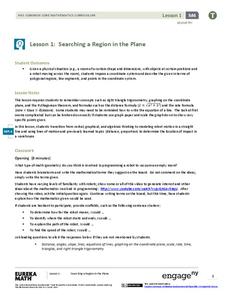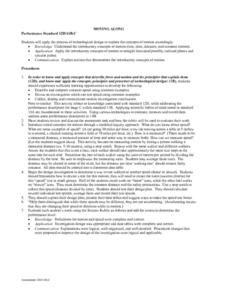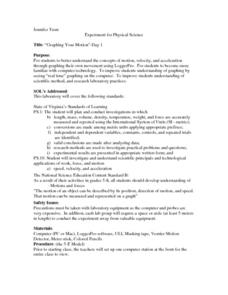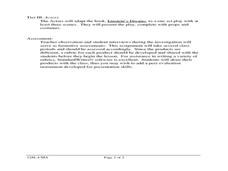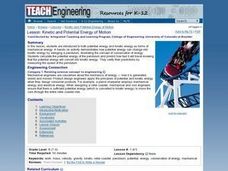Physics Classroom
Action-Reaction Lab
Computer-interfaced motion detectors are required to carry out this inquiry. It is a new twist on exploring motion with plunger carts: they are set back-to-back and then propelled away from each other. Their velocities are measured, and...
New Mexico State University
Lab 6: Kepler's Laws
A 15-page package thoroughly teaches your physics or astronomy learners about Kepler's three laws of planetary motion. Each one is stated and explained. Class members answer questions, solve problems, and participate in the classic...
EngageNY
Searching a Region in the Plane
Programming a robot is a mathematical task! The activity asks learners to examine the process of programming a robot to vacuum a room. They use a coordinate plane to model the room, write equations to represent movement, determine the...
Curated OER
Moving Along
Students are introduced to the concept of motion. In groups, they practice calculating the rate, time, and distance of various objects on a variety of surfaces. To end the lesson, they apply the same principles to those objects moving...
Curated OER
Graphing Speed
High schoolers use LOGAL motion detector probe and observe a generated graph as a student performs various standard motions, and make measurements of time and distance. They suggest various time and distance measurements which a student...
Curated OER
Blast Off
Students investigate how rocket thrust is generated with propellant. They listen to a teacher-led lecture, discuss Newton's third law of motion, answer discussion questions, and view photos of rockets and rocket designs.
Curated OER
Traveling Bowls
Students investigate the relationship between force and motion while conducting an experiment to answer the question,"How do objects move?". In small groups, they predict how many washers are needed to pull a bowl across a finish line.
Curated OER
Using Quantitative Statements to Solve Problems
In this equations worksheet, students use quantitative statements to sole for average speed. This worksheet has 4 problems to solve.
Curated OER
Swinging
Students examine and modify a swinging apparatus. They describe the motion of an object by its position, direction of motion, and speed. Students measure motion using a graph.
Curated OER
How Does a Satellite Stay in Orbit?
Young scholars explore placing a satellite into orbit, then about forces needed to keep an object in orbit. They examine how satellites orbit in elliptical paths and about properties of ellipses. They learn Kepler's 3rd Law of Planetary...
Curated OER
Hlf-Ball
Pupils investigate Newton's Laws of Motion and the Law of Conservation of Energy. They examine how a ball and half-ball behave and relate these laws to what happens to the ball. Students produce a graph of the data collected and...
Curated OER
Changes in Force, Motion, and Energy
Eighth graders construct various machines and compare the work done by them.
Curated OER
Vectors: Follow That Arrow
Vectors and their connection to motion. A video will be presented to provide information for the class to use methods of solving vectors with and without grids. Real-world physical concepts will be explored in reference to vectors.
Curated OER
Graphing Your Motion-Day 1
Ninth graders explore the concepts of motion, velocity and acceleration through graphing their own movement using LoggerPro. They become more familiar with the computer technology. Students explore graphing in real time and graph on...
Curated OER
Historical Perspectives
Twelfth graders watch episodes of Star Trek and analyze the works of it that pertain to the theory of relativity. In this creative lesson students also write and illustrate a children's book about the special theory of relativity.
Curated OER
Super Gelatin
Learners investigate the refraction properties of gelatin to calculate its index of refraction. They discover that as the light travels through the gelatin, its speed and wavelength also change. Students find th indes of refraction of an...
Curated OER
Extreme Acceleration
Students explore the concept of acceleration. They determine the acceleration rate of a roller-blader and graph the results.
Curated OER
Travel Time
Young scholars use a migration map to estimate the distance traveled by a bird while migrating south. After calculating accurate estimates of the distance traveled, students compare the distances traveled with the amount of time elapsed.
Curated OER
Intro to 1D Kinematics with Physlets
Twelfth graders examine illustrations and animations on a Physlets CD in which they must describe motion, analyze graphs, and calculate initial velocity. The Physlet assists in providing active class participation in discussion.
Curated OER
Music's Speed Zone
First graders read the story of the Tortoise and the Hare and relate it to tempo in music.
Curated OER
TE Lesson: Kinetic and Potential Energy of Motion
Students investigate the difference between potential and kinetic energy. They examine the formulae associated with both types of energy. They complete how quickly a pendulum with swing by converting potential energy into kinetic energy.
Mathematics Vision Project
Module 6: Trigonometric Functions
Create trigonometric functions from circles. The first lesson of the module begins by finding coordinates along a circular path created by a Ferris Wheel. As the lessons progress, pupils graph trigonometric functions and relate them to...
Teach Engineering
The Great Gravity Escape
Groups simulate an orbit using a piece of string and a water balloon. Individuals spin in a circular path and calculate the balloon's velocity when the clothes pin can no longer hold onto the balloon.
Teach Engineering
May the Force Be With You: Drag
Do not let friction drag you down! The 11th segment in a series of 22 focuses on the fourth force acting upon an airplane—drag. Pupils learn about the effects and causes of drag.




